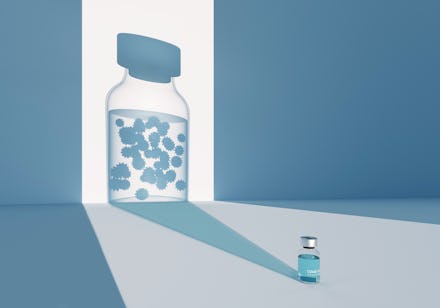The pause on the Johnson & Johnson vaccine just means that science is working

Federal health agencies have recommended that the U.S. hit pause on administering the Johnson & Johnson COVID-19 vaccine while they review reports of six cases of a rare blood clotting disorder, according to the New York Times. While the move may fuel vaccine hesitancy among vaccine centrists and others, experts see it as a reassuring sign that our health agencies and vaccination strategy are working as they’re supposed to — investigating reports of concerning side effects and responding accordingly.
A statement released Tuesday from Anne Schuchat, principal deputy director of the CDC, and Peter Marks, director of the FDA's Center for Biologics Evaluation and Research, noted that both agencies will investigate the cases. “Until that process is complete, we are recommending a pause in the use of this vaccine out of an abundance of caution,” it said. At a news briefing on Tuesday, FDA acting commissioner Janet Woodcock estimated the pause would likely last a “matter of days,” the Times reports, depending on “what we learn in the next few days.
The blood clotting disorder observed, known as cerebral venous sinus thrombosis, is “a severe strokelike illness linked to low platelet counts,” Schuchat said in the Tuesday briefing, according to the Times. That said, it’s also extremely rare. The disorder arose in six women between 18 and 48 years of age within one to three weeks of vaccination, among the nearly seven million who have received the Johnson & Johnson single-dose vaccine. Still, Schuchat advised those who got the vaccine within the past few weeks to contact their healthcare provider if they “develop severe headaches, abdominal pain, leg pain or shortness of breath.”
States responded swiftly to the announcement of the pause, the Times reports, with Ohio, New York, Nebraska, and several other states advising its health providers to stop administering the Johnson & Johnson vaccine for now. So, too, have CVS, Walgreens, and the U.S. military. Other federally-run vaccination sites are also expected to enact a pause.
All of this flurry might seem alarming, but it also indicates a functioning vaccination strategy. As Stacy De-Lin, a board-certified physician and COVID-19 science communicator pointed out in an Instagram caption, “this is how the system is designed to work: to monitor, evaluate, and respond to any reports of adverse events.” That it's responding so rapidly to what seems to be an extremely rare adverse event is even more encouraging. Science is self-correcting, in other words, changing course based on any new data that might emerge.
Indeed, during the pause, FDA and CDC scientists will investigate the cause of this rare blood clotting disorder, including whether it’s linked to the vaccine, the Times explains. Based on what they find, they’ll decide whether the FDA should still authorize its use for all adults or, say, limit it to only certain populations.
The pause would also allow health care systems to prepare to “recognize and treat patients appropriately,” Schuchat said in the briefing, per the Times. The newspaper noted that federal officials worry that doctors might not be trained to look for the blood clotting disorder in people injected with the Johnson & Johnson vaccine. What's more, the treatment for this type of blood clot differs from that typically applied to blood clots, the federal health agencies said on Tuesday.
It’s important to note that until the FDA and CDC complete their investigation, we don’t know whether the blood clotting disorder is connected to the vaccine. Even if it was, the risk of getting a blood clot from COVID-19 would still be much higher than the risk of getting a blood clot from the Johnson & Johnson vaccine. In a Twitter thread, Megan Ranney, an emergency room physician at Brown Emergency Medicine, cited an analysis in The Lancet that estimated that you if you come down with COVID-19, you have around a 20% risk of getting a blood clot — compared to the six cases out of 6.8 million Johnson & Johnson recipients.
Ranney also cited a CNBC Squawk Box interview with former FDA commissioner Scott Gottlieb, in which he said that although the pause was “an awkward regulatory step,” the FDA “didn’t revoke the EUA [emergency use authorization], they didn’t order this off the market.” Basically, the pause will simply allow scientists to better understand the cause of these blood clots, decide whether to adjust the guidance, and train doctors in spotting and treating the blood clots if they do occur.
“Looking forward to more data on WHO is at risk (if anyone), and WHAT the next steps should be,” Ranney tweeted. “The guidance will evolve. If anything, though, this should reassure folks that the science is transparent. Nothing is being hidden. We are all on the same team.”